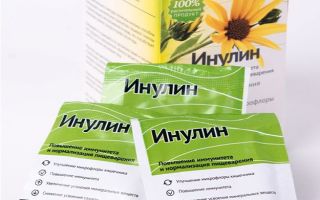Content
This carbohydrate got its name from the name of the plant Inula helenium, from which it was isolated in the early 19th century. The benefits and harms of inulin, its dietary properties have been actively studied since the 1990s, since that time drugs based on it have also gained great popularity.
What is inulin and what is it for
Inulin is an organic carbohydrate, polysaccharide, which contains tubers and stems of more than 300 plants, among which Jerusalem artichoke and chicory are leaders in its quantity. In fact, it serves as the plant's energy reserve, which is formed from the remnants of fructose.
Similar in its chemical formula to fiber, inulin at the same time exhibits the properties of a prebiotic, nourishing the intestinal microflora and cleansing the body of harmful substances.
Physically, the substance is in the form of a white powder, readily soluble in hot liquids and is widely used in the food industry to obtain fructose.
Inulin production technology
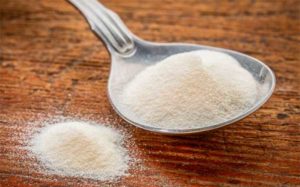
Inulin is obtained mainly from Jerusalem artichoke and chicory, a gentle method of cold pressing, the benefit of which is that it helps to preserve all the valuable properties of this prebiotic.
Raw materials are crushed under the action of steam to prevent enzymatic oxidation and preserve useful properties. The resulting powder in special U-shaped columns - extractors - with the participation of hot water is subjected to extraction with the formation of inulin itself. The extracted raw material is thickened, as a result of which inulin is precipitated, then it is passed through a number of purification stages and dried.
Useful properties of inulin
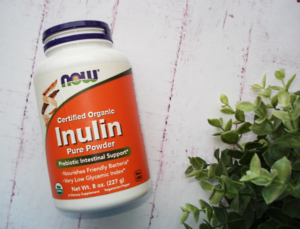
Like fiber, inulin assimilation does not take place in the upper parts of the gastrointestinal tract, therefore, while retaining its unchanged appearance, it gradually passes into the intestine, performing the function of a "broom" and cleansing the intestines, which helps to improve its peristalsis.
However, this is where its similarity to fiber ends: the absorption of the substance begins in the large intestine with the simultaneous nutrition of beneficial "native" bifidobacteria of the body, which, unlike the "alien" live bacteria contained in dairy products, cannot but be assimilated. Here he takes on the function of a prebiotic with all the useful properties of the latter to stimulate the growth of useful and prevent the harm of the development of pathogenic microflora and dysbiosis.
The benefits of inulin as a prebiotic and body purifier are not limited to these functions:
- The property of inulin has been proven to cleanse the body of toxins, radionucleides and heavy metals.
- With the help of inulin, such trace elements as calcium, magnesium, iron, copper, phosphorus are absorbed 30% better. And thanks to the increase in the absorption of magnesium, there is an increase in the activity of more than 300 enzymes that affect the regulation of the cardiovascular system and the level of fats in the blood.
Important! Stimulating the absorption of calcium gives the effect of compaction of inert tissue by 25% with regular use of the substance throughout the year.
- As an anticoagulant, the beneficial polysaccharide prevents the formation of blood clots.
- It also indirectly affects the reduction of the harm of "bad" cholesterol in the blood, which helps prevent the formation of plaques on the walls of blood vessels and the development of atherosclerosis.
- Inulin is involved in carbohydrate and lipid metabolism: due to the activation of metabolism, the coupled processes of glucose uptake and fat burning are accelerated, and therefore it is highly beneficial in the treatment of type 1 and type 2 diabetes, as well as in lowering blood pressure in hyperlipidemia.
- As an immunomodulator, inulin tends to increase the metabolic rate, which affects the increase in the body's endurance.
- In addition, there is a high use of carbohydrates in cleansing lymph and normalizing its composition, which increases the resistance of the mucous membrane of such organs and systems as the gastrointestinal tract, bronchial tree, ureters, which consists of it partially.
- Possessing hepatoprotective properties, the product stimulates the restoration of damaged liver tissue, which is used in the complex therapy of hepatitis B and C.
- In addition, the low calorie content of chicory and the pleasant creamy taste are actively used in the food industry and for the dietary menu, for example, to create a feeling of satiety without spending additional calories.
- Inulin chicory extract is used as a drink that replaces natural coffee with health benefits.
The benefits of inulin for weight loss

In the process of weight loss, the body undergoes a great load: both physiological and emotional.
Weight loss with the use of inulin occurs gradually due to the stimulation of lipid and carbohydrate metabolism. Its entry into the bloodstream helps to bind triglycerides, fatty acids and cholesterol, regulate the activity of liver enzymes that affect fat metabolism, as well as absorb glucose and lower its level in the blood.
As a beneficial prebiotic, inulin stimulates intestinal activity to help detoxify the body from harmful toxins, thereby optimizing nutrient absorption.
Due to the gel-forming and enveloping action of inulin, saturation hormones are activated in the stomach, which reduces the feeling of hunger during the period of use of the drug.
In addition, the low calorie content of the product speaks in favor of its use on diets.
The advantage of using inulin in the composition of preparations is its natural mild effect on the body: the course should be long and the results appear from the third month, which indicates an undoubted health benefit.
For the maximum manifestation of the beneficial properties of the supplement, experts recommend accompanying the course of intake with a therapeutic diet and physical activity.
What foods contain inulin
Of organic sources, Jerusalem artichoke stands out with the highest inulin content: 14 - 18%.
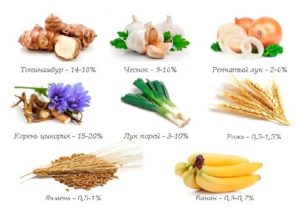
Further, the rating by the percentage of polysaccharide content is continued:
- chicory - 15 - 20%;
- garlic - 9-16%;
- onions and leeks - 2 - 10%.
And its amount is expressed more modestly in the composition of bananas and cereals.
Inulin also contains a dairy product line: milk, cheese, kefir, butter.
Dandelion and elecampane are famous for their inulin content.
Inulin use
The substance is used as an improver for the properties of ice cream, sauces and other products made from vegetable and milk fats: with its participation the products acquire a bright taste similar to those of animal fats.
The product is also used as a structure stabilizer in food products.
Inulin in baby food

Mother's milk is a prebiotic balanced in terms of vitamin and mineral composition, and in the future, the baby's nutrition should retain these properties - replenish all the necessary elements against the background of beneficial intestinal microflora: this function is performed by inulin. Included in baby formulas, it improves digestive functions, promotes the absorption of magnesium and calcium.
Thanks to these beneficial properties, infant formula with inulin helps in the formation of a growing body:
- strengthening of bone tissue;
- an increase in useful bifido flora in the intestine;
- replenishment of vitamin and mineral reserves.
The indications of such mixtures especially concern children with problems of frequent constipation, flatulence, dysbiosis.
A useful prebiotic is also included in hypoallergenic cereals, and then their indications apply to cases of individual allergic reactions. Here, too, its benefits are noticeable in accelerating the elimination of harmful allergens from the body.
Inulin in cosmetics
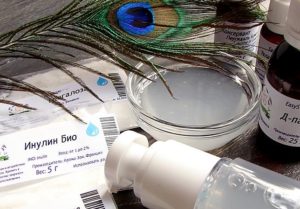
As an additive, the substance is included in anti-aging cosmetics and hair products.
Creams, masks, tonics and serums can have a beneficial effect on the skin:
- cleansing, moisturizing and nourishing it;
- increasing local immunity;
- improving blood circulation and oxygen metabolism;
- stimulating cell regeneration, collagen synthesis and elastin production;
- softening rough areas;
- smoothing out fine wrinkles;
- leveling the relief.
Means containing a polysaccharide also have the beneficial property of relieving body cells from the harm of the phenomenon of oxidative stress that has spread in our time - against the background of poor ecology, disorders of the nervous system and love of fast food.
Thanks to these properties, inulin has established itself as an organic ingredient in cosmetic production technologies.
Chicory Soothing Lotion Recipe:
Chopped chicory (1 tbsp. L.) Is poured with one glass of boiling water, wrapped and insisted.
As a lotion, this infusion is used to wipe problem skin at the beginning and at the end of the day. Store the product in the refrigerator for no more than a week.
The addition of polysaccharide benefits the hair in the formulation by providing effective scalp hydration and additional nourishment to the roots. Inulin has the ability to actively work with the hair shaft, restoring its damage, solving the problems of cutting and shedding, imparting softness and obedience, which can bring real salvation to the owners of weakened and dull hair.
As a conditioning additive in cosmetics, it is able to envelop hair in a protective layer, soften shampoo, smooth it and add shine.
In addition, the advantage of inulin will be its ability to fix aromas in cosmetics.
Harm of inulin and contraindications
All contraindications to the use of inulin supplements are as follows:
- to individual intolerance;
- the period of pregnancy and lactation;
- under the age of 12.
In such cases, the body's reaction may be a rash, redness and peeling, digestive problems in the form of nausea, belching, heartburn, diarrhea, constipation.
In chronic diseases, it is imperative to prescribe inulin-containing drugs by a doctor.

There are some data on the harm to the body of inulin chicory in the following cases:
- parallel use of antibiotics due to the neutralizing action of inulin;
- varicose veins;
- hemorrhoids;
- spasmodic symptoms in the respiratory system.
Inulin preparations
Inulin-containing preparations do not belong to medicinal products: they serve as food biologically active additives to products for dietary and therapeutic-and-prophylactic nutrition.
There are preparations on the market that contain high molecular weight inulin with the inclusion of fiber of various phytoextracts and extracts that enhance the properties of the prebiotic, such as:
- Inulin Forte,
- Fitoflax,
- Inulin-Nutrimed and others.

Inulin Forte is an auxiliary drug. It is indicated for the compensated form of diabetes mellitus, it is also suitable for the prevention of coronary heart disease. A significant proportion are potassium and magnesium, which are necessary for the normal functioning of the heart. Contains essential amino acids, macro- and microelements. The active ingredient is inulin isolated from Jerusalem artichoke.
The drug has the following beneficial properties:
- the ability to normalize the activity of the cardiovascular system: the composition is rich in thiamine, riboflavin, ascorbic acid.
- due to the content of leucine and isoleucine, control the action of insulin;
- improve immunity;
- remove harmful decay products;
- suppress hunger - thanks to the tryptophan included in it; in addition, wheat bran as a source of dietary fiber helps the body to ensure fast satiety;
- speed up metabolism;
- fiber and pectin have properties to reduce the load on the kidneys, to promote digestion in the intestine, which is useful for overweight people;
- prevent the development of liver dystrophy;
- participate in the processes of mineralization of the bone system - thanks to calcium, phosphorus;
- support the processes of hematopoiesis with iron in the composition.
How to take inulin
Inulin is prescribed for children from 12 years of age and adults, 1 g three times a day (along with food). One tablet contains 0.35 g of substance and 0.15 g of fiber.
During the period of antibiotic use, this phytopreparation is contraindicated.
Conclusion
The benefits and harms of inulin are currently well studied in connection with its demand. The useful properties of this supplement can hardly be overestimated: both as an alternative to glucose, and as a prebiotic, and as an excellent body purifier, while the harm is associated with cases of a special reaction to the drug during allergies, pregnancy and lactation. However, including even a healthy food in your diet should be a smart move, accompanied by specialist advice.

